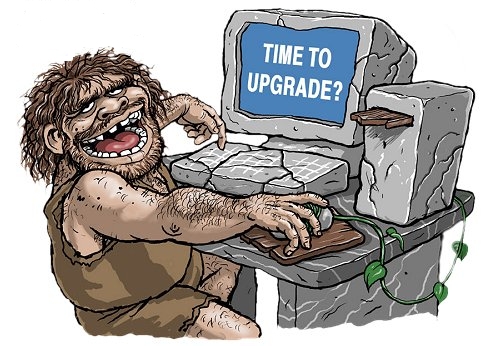|
How long do computers last?
While it may seem like computers and other high technology electronics have a shelf life shorter than dairy products. Most of the computers that are discarded are still functional but have become obsolete.
 Some computers last a long time but eventually... Some computers last a long time but eventually...
Physically the average PC should last at least three to five years and sometimes longer than that. I have machines running that are very much older than just five years. (I would be embarrassed to tell you exactly how old some of these “recycler refuges” are.)
There are many things can send you computer to an early grave. Besides the obvious fatalities from physical damage such falling off the table and landing on the floor, running over it with the car or soaking it with conductive liquids such as coffee.
What parts usually fail first? Mechanical failure of the moving parts is the most common post mortem in PC’s. The two most common are the power supply and the hard drive. And it is the moving parts in each that usually cause the failure.
The solid state components usually last a lot longer. They are not subject to mechanical wear and tear and as long as they don’t overheat or get “zapped” by over voltage they can last for decades. The most common failure is, “leakage”.
The culprit is those little can shaped electrolytic capacitors. They overheat and the precious electrolyte oozes out. Once that happens the device doesn’t work properly. In technical terms it doesn’t “meet spec” anymore. This is usually a result of poor design. Stolen secret formulas that were incomplete and botched corporate espionage have also played a part. Special “caps” designed to operate with the “fast switching” power supplies used in modern computers are available. But they cost a few cents more and you probably know the rest of that story.
Tin whiskers are another cause of failure. In ancient times the solder used to assemble electronic components was a mixture of lead and tin. They took the lead out. Without the lead the tin can re-crystallize into long thin “whiskers”. Sometimes these tin crystals can be several centimeters long and in the tiny world of electronics that is huge. These conductive whiskers cause “shorts” in the electrical circuits and that just ruins everything. Not just a problem for terrestrial devices, several expensive communication satellites have been reduces to orbital debris by these hair like crystals.
What can you do to prevent an early demise of your valuable electronics?
While you can’t do much about solid state problems like leakage or tin whiskers a few, “common sense” precautions can help you electronics live to a ripe old age.
|